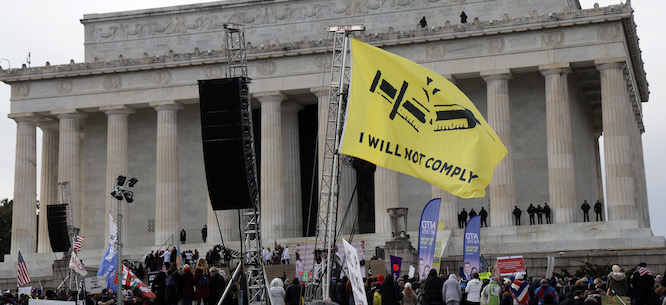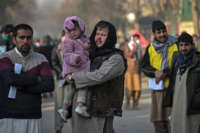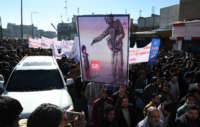
The American population was bombarded the way the Iraqi population was bombarded. It was a war against us, a war of lies and disinformation and omission of history. That kind of war, overwhelming and devastating, waged here in the US while the Gulf War was waged over there.’ ((Howard Zinn, ‘Power, History and Warfare’, Open Magazine Pamphlet Series, No. 8, 1991, p. 12.))
What a strange feeling it was to know that the cruise missile shown descending towards an airport and erupting in a ball of flame was not fired by US or British forces.
Millions of Westerners raised to admire the ultimate spectacle of high-tech, robotic power, must have quickly suppressed their awe at the shock – this was Russia’s war of aggression, not ‘ours’. This was not an approved orgy of destruction and emphatically not to be celebrated.
Rewind to April 2017: over video footage of Trump’s cruise missiles launching at targets in Syria in response to completely unproven claims that Syria had just used chemical weapons, MSNBC anchor Brian Williams felt a song coming on:
‘We see these beautiful pictures at night from the decks of these two US navy vessels in the eastern Mediterranean – I am tempted to quote the great Leonard Cohen: “I’m guided by the beauty of our weapons” – and they are beautiful pictures of fearsome armaments making what is, for them, a brief flight…’
TV and newspaper editors feel the same way. Every time US-UK-NATO launches a war of aggression on Iraq, Libya, Syria – whoever, wherever – our TV screens and front pages fill with ‘beautiful pictures’ of missiles blazing in pure white light from ships. This is ‘Shock And Awe’ – we even imagine our victims ‘awed’ by our power.
In 1991, the ‘white heat’ of our robotic weaponry was ‘beautiful’ because it meant that ‘we’ were so sophisticated, so civilised, so compassionate, that only Saddam’s palaces and government buildings were being ‘surgically’ removed, not human beings. This was keyhole killing. The BBC’s national treasure, David Dimbleby, basked in the glory on live TV:
‘Isn’t it in fact true that America, by dint of the very accuracy of the weapons we’ve seen, is the only potential world policeman?’
Might makes right! This seemed real to Dimbleby, as it did to many people. In fact, it was fake news. Under the 88,500 tons of bombs that followed the launch of the air campaign on January 17, 1991, and the ground attack that followed, 150,000 Iraqi troops and 50,000 civilians were killed. Just 7 per cent of the ordnance consisted of so called ‘smart bombs’.
By contrast, the morning after Russia launched its war of aggression on Ukraine, front pages were covered, not in tech, but in the blood of wounded civilians and the rubble of wrecked civilian buildings. A BBC media review explained:
‘A number of front pages feature a picture of a Ukrainian woman – a teacher named Helena – with blood on her face and bandages around her head after a block of flats was hit in a Russian airstrike.
‘“Her blood on his hands” says the Daily Mirror; the Sun chooses the same headline.’
‘Our’ wars are not greeted by such headlines, nor by BBC headlines of this kind:
‘In pictures: Destruction and fear as war hits Ukraine’
The fear and destruction ‘we’ cause are not ‘our’ focus.
Former Guardian journalist Jonathan Cook noted:
‘Wow! Radical change of policy at BBC News at Ten. It excitedly reports young women – the resistance – making improvised bombs against Russia’s advance. Presumably Palestinians resisting Israel can now expect similar celebratory coverage from BBC reporters’
A BBC video report was titled:
‘Ukraine conflict: The women making Molotov cocktails to defend their city’
Hard to believe, but the text beneath read:
‘The BBC’s Sarah Rainsford spoke to a group of women who were making Molotov cocktails in the park.’
For the entire morning of March 2, the BBC home page featured a Ukrainian civilian throwing a lit Molotov cocktail. The adjacent headline:
‘Russian paratroopers and rockets attack Kharkiv – Ukraine’
In other words, civilians armed with homemade weapons were facing heavily-armed elite troops. Imagine the response if, in the first days of an invasion, the BBC had headlined a picture of a civilian in Baghdad or Kabul heroically resisting US-UK forces in the same way.
Another front-page BBC article asked:
‘Ukraine invasion: Are Russia’s attacks war crimes?’
The answer is ‘yes,’ of course – Russia’s attack is a textbook example of ‘the supreme crime’, the waging of a war of aggression. So, too, was the 2003 US-UK invasion and occupation of Iraq. But, of course, the idea that such an article might have appeared in the first week of that invasion is completely unthinkable.
Generating The Propaganda Schwerpunkt
On 27 February, the first 26 stories on the BBC’s home page were devoted to the Russian attack on Ukraine. The BBC website even typically features half a dozen stories on Ukraine at the top of its sports section.
On 28 February, the Guardian’s website led with the conflict, followed by 20 additional links to articles about the Ukraine crisis. A similar pattern is found in all ‘mainstream’ news media.
The inevitable result of this level of media bombardment on many people: Conflict in Ukraine is ‘our’ war – ‘I stand with Ukraine!’
Political analyst Ben Norton commented:
‘Russia’s intervention in Ukraine has gotten much more coverage, and condemnation, in just 24 hours than the US-Saudi war on Yemen has gotten since it started nearly 7 years ago… US-backed Saudi bombing now is the worst since 2018’
This is no small matter. Norton added:
‘An estimated 377,000 Yemenis have died in the US-Saudi war on their country, and roughly 70% of deaths were children under age 5’
Some 15.6 million Yemenis live in extreme poverty, and 8.6 million suffer from under-nutrition. A recent United Nations report warned:
‘If war in Yemen continues through 2030, we estimate that 1.3 million people will die as a result.’
Over half of Saudi Arabia’s combat aircraft used for the bombing raids on Yemen are UK-supplied. UK-made equipment includes Typhoon and Tornado aircraft, Paveway bombs, Brimstone and Stormshadow missiles, and cluster munitions. Campaign Against the Arms Trade reports:
‘Researchers on the grounds have discovered weapons fragments that demonstrate the use of UK-made weapons in attacks on civilian targets.’
Despite the immensity of the catastrophe and Britain’s clear legal and moral responsibility, in 2017, the Independent reported:
‘More than half of British people are unaware of the “forgotten war” underway in Yemen, despite the Government’s support for a military coalition accused of killing thousands of civilians.
‘A YouGov poll seen exclusively by The Independent showed 49 per cent of people knew of the country’s ongoing civil war, which has killed more than 10,000 people, displaced three million more and left 14 million facing starvation.
‘The figure was even lower for the 18 to 24 age group, where only 37 per cent were aware of the Yemen conflict as it enters its third year of bloodshed.’
The Independent added:
‘At least 75 people are estimated to be killed or injured every day in the conflict, which has pushed the country to the brink of famine as 14 million people lack a stable access to food.’
On Twitter, Dr Robert Allan made the point that matters:
‘We as tax paying citizens and as a nation are directly responsible for our actions. Not the actions of others. Of course we can and should highlight crimes of nations and act appropriately and benevolently (the UK record here is horrific). 1st – us, NATO, our motives and actions.’
We can be sure that Instagram, YouTube and Tik Tok will never be awash with the sentiment: ‘I stand with Yemen!’
As if the whole world belongs to ‘us’, our righteous rage on Ukraine is such that we apparently forget that we are not actually under attack, not being bombed; our soldiers and civilians are not being killed. Nevertheless, RT (formerly Russia Today), Going Underground and Sputnik have been shut down on YouTube and Google as though the US and UK were under direct attack, facing an existential threat.
Certainly, we at Media Lens welcome the idea that powerful state-corporate media should be prevented from promoting state violence. It is absurd that individuals are arrested and imprisoned for threatening or inciting violence, while journalists regularly call for massive, even genocidal, violence against whole countries with zero consequences (career advancement aside). But banning media promoting state violence means banning, not just Russian TV, but literally all US-UK broadcasters and newspapers.
Confirming the hypocrisy, The Intercept reported:
‘Facebook will temporarily allow its billions of users to praise the Azov Battalion, a Ukrainian neo-Nazi military unit previously banned from being freely discussed under the company’s Dangerous Individuals and Organizations policy, The Intercept has learned.’
In 2014, the Guardian’s central and eastern Europe correspondent, Shaun Walker, wrote:
‘The Azov, one of many volunteer brigades to fight alongside the Ukrainian army in the east of the country, has developed a reputation for fearlessness in battle.
‘But there is an increasing worry that while the Azov and other volunteer battalions might be Ukraine’s most potent and reliable force on the battlefield against the separatists, they also pose the most serious threat to the Ukrainian government, and perhaps even the state, when the conflict in the east is over. The Azov causes particular concern due to the far right, even neo-Nazi, leanings of many of its members.’
The report continued:
‘Many of its members have links with neo-Nazi groups, and even those who laughed off the idea that they are neo-Nazis did not give the most convincing denials.’
Perhaps the hundreds of journalists who attacked Jeremy Corbyn for questioning the removal of an allegedly anti-semitic mural – which depicted a mixture of famous historical and identifiable Jewish and non-Jewish bankers – with the single word, ‘Why?’, would care to comment?
According to our ProQuest search, the Guardian has made no mention of the neo-Nazi Azov Battalion in the last week – as it most certainly would have, if Ukraine were an Official Enemy of the West. ProQuest finds a grand total of three mentions of the Azov Battalion in the entire UK national press – two in passing, with a single substantial piece in the Daily Star – in the last seven days. ‘Impressive discipline’, as Noam Chomsky likes to say.
‘Russia Must Be Broken’
Britain and the US have been waging so much war, so ruthlessly, for so long, that Western journalists and commentators have lost all sense of proportion and restraint. Neil Mackay, former editor of the Sunday Herald (2015-2018), wrote in the Herald:
‘Russia must be broken, in the hope that by breaking the regime economically and rendering it a pariah state on the world’s stage, brave and decent Russian people will rise up and drag Putin from power.’
If nothing else, Mackay’s comment indicated just how little impact was made by the deaths of 500,000 children under five when the US and Britain saw to it that the Iraq economy was ‘broken’ by 13 years of genocidal sanctions.
For describing his comment as ‘obscene’, Mackay instantly blocked us on Twitter. His brutal demand reminded us of the comment made by columnist Thomas Friedman in the New York Times:
‘Like it or not, we are at war with the Serbian nation… and the stakes have to be very clear: Every week you ravage Kosovo is another decade we will set your country back by pulverising you. You want 1950? We can do 1950. You want 1389? We can do 1389 too.’
We can enjoy the ‘shock and awe’ of that comment, if we have no sense at all that Serbian people are real human beings capable of suffering, love, loss and death exactly as profound as our own.
On Britain’s Channel 5, BBC stalwart Jeremy Vine told a caller, Bill, from Manchester:
‘Bill, Bill, the brutal reality is, if you put on a uniform for Putin and you go and fight his war, you probably deserve to die, don’t you?’
Unlike his celebrated interviewer, Bill, clearly no fan of Putin, had retained his humanity:
‘Do you?! Do kids deserve to die, 18, 20 – called up, conscripted – who don’t understand it, who don’t grasp the issues?’
Vine’s sage reply:
‘That’s life! That’s the way it goes!’
We all know what would have happened to Vine if he had said anything remotely comparable of the US-UK forces that illegally invaded Iraq.
MSNBC commentator Clint Watts observed:
‘Strangest thing – entire world watching a massive Russian armor formation plow towards Kyiv, we cheer on Ukraine, but we’re holding ourselves back. NATO Air Force could end this in 48 hrs. Understand handwringing about what Putin would do, but we can see what’s coming’
The strangest thing is media commentators reflexively imagining that US-UK-NATO can lay any moral or legal claim to act as an ultra-violent World Police.
Professor Michael McFaul of Stanford University, also serving with the media’s 101st Chairborne Division, appeared to be experiencing multiple wargasms when he tweeted:
‘More Stingers to Ukraine! More javelins! More drones!’
Two hours later:
‘More NLAWs [anti-tank missiles], Stingers (the best ones), and Javelins for Ukraine! Now!’
Echoing Mackay, McFaul raved (and later deleted):
‘There are no more “innocent” “neutral” Russians anymore. Everyone has to make a choice— support or oppose this war. The only way to end this war is if 100,000s, not thousands, protest against this senseless war. Putin can’t arrest you all!’
Courageous words indeed from his Ivy League office. Disturbing to note that McFaul was ambassador to Russia under Barack Obama, widely considered to be a saint.
‘Shockingly Arrogant Meddling’ – The Missing History
So how did we get here? State-corporate news coverage has some glaring omissions.
In February 2014, after three months of violent, US-aided protests, much of it involving neo-Nazi anti-government militias, the president of Ukraine, Viktor Yanukovych, fled Kiev for Russia. Fairness and Accuracy in Reporting (FAIR) provide some context:
‘On February 6, 2014, as the anti-government protests were intensifying, an anonymous party (assumed by many to be Russia) leaked a call between Assistant Secretary of State [Victoria] Nuland and US ambassador to Ukraine Geoffrey Pyatt. The two officials discussed which opposition officials would staff a prospective new government, agreeing that Arseniy Yatsenyuk — Nuland referred to him by the nickname “Yats” — should be in charge. It was also agreed that someone “high profile” be brought in to push things along. That someone was Joe Biden.’
The BBC reported Nuland picking the new Ukrainian leader:
‘I think “Yats” is the guy who’s got the economic experience, the governing experience.’
FAIR continues:
‘Weeks later, on February 22, after a massacre by suspicious snipers brought tensions to a head, the Ukrainian parliament quickly removed Yanukovych from office in a constitutionally questionable maneuver. Yanukovych then fled the country, calling the overthrow a coup. On February 27, Yatsenyuk became prime minister.’
We can read between the lines when Nuland described how the US had invested ‘over $5 billion’ to ‘ensure a secure and prosperous and democratic Ukraine’.
In a rare example of dissent in the Guardian, Ted Galen Carpenter, senior fellow for defence and foreign policy studies at the Cato Institute, wrote this week:
‘The Obama administration’s shockingly arrogant meddling in Ukraine’s internal political affairs in 2013 and 2014 to help demonstrators overthrow Ukraine’s elected, pro‐Russia president was the single most brazen provocation, and it caused tensions to spike. Moscow immediately responded by seizing and annexing Crimea, and a new cold war was underway with a vengeance…’
Carpenter concluded:
‘Washington’s attempt to make Ukraine a Nato political and military pawn (even absent the country’s formal membership in the alliance) may end up costing the Ukrainian people dearly.
‘History will show that Washington’s treatment of Russia in the decades following the demise of the Soviet Union was a policy blunder of epic proportions. It was entirely predictable that Nato expansion would ultimately lead to a tragic, perhaps violent, breach of relations with Moscow. Perceptive analysts warned of the likely consequences, but those warnings went unheeded. We are now paying the price for the US foreign policy establishment’s myopia and arrogance.’
Within days of the 2014 coup, troops loyal to Russia took control of the Crimea peninsula in the south of Ukraine. As Jonathan Steele, a former Moscow correspondent for the Guardian, recently explained:
‘NATO’s stance over membership for Ukraine was what sparked Russia’s takeover of Crimea in 2014. Putin feared the port of Sevastopol, home of Russia’s Black Sea fleet, would soon belong to the Americans.’
The New Yorker magazine describes political scientist John Mearsheimer as ‘one of the most famous critics of American foreign policy since the end of the Cold War’:
‘For years, Mearsheimer has argued that the U.S., in pushing to expand NATO eastward and establishing friendly relations with Ukraine, has increased the likelihood of war between nuclear-armed powers and laid the groundwork for Vladimir Putin’s aggressive position toward Ukraine. Indeed, in 2014, after Russia annexed Crimea, Mearsheimer wrote that “the United States and its European allies share most of the responsibility for this crisis.”’
Mearsheimer argues that Russia views the expansion of NATO to its border with Ukraine as ‘an existential threat’:
‘If Ukraine becomes a pro-American liberal democracy, and a member of NATO, and a member of the E.U., the Russians will consider that categorically unacceptable. If there were no NATO expansion and no E.U. expansion, and Ukraine just became a liberal democracy and was friendly with the United States and the West more generally, it could probably get away with that.’
Mearsheimer adds:
‘I think the evidence is clear that we did not think he [Putin] was an aggressor before February 22, 2014. This is a story that we invented so that we could blame him. My argument is that the West, especially the United States, is principally responsible for this disaster. But no American policymaker, and hardly anywhere in the American foreign-policy establishment, is going to want to acknowledge that line of argument…’
In 2014, then US Secretary of State John Kerry had the gall to proclaim of Russia’s takeover of Crimea:
‘You just don’t in the 21st century behave in 19th century fashion by invading another country on completely trumped up pretext.’
Senior BBC correspondents somehow managed to report such remarks from Kerry and others, without making any reference to the West’s invasions of Iraq and Afghanistan.
The pattern persists today. When Fox News recently spoke about the Russia-Ukraine crisis with former US Secretary of State, Condoleezza Rice, one of the key perpetrators of the illegal invasion-occupations of Afghanistan and Iraq, she nodded her head in solemn agreement when the presenter said:
‘When you invade a sovereign nation, that is a war crime.’
The cognitive dissonance required to engage in this discussion and pass it off as serious analysis is truly remarkable.
Noam Chomsky highlights one obvious omission in Western media coverage of Ukraine, or any other crisis involving NATO:
‘The question we ought to be asking ourselves is why did NATO even exist after 1990? If NATO was to stop Communism, why is it now expanding to Russia?’
It is sobering to read the dissenting arguments above and recall Labour leader Sir Keir Starmer’s warning to MPs last week:
‘Let me be very clear – There will be no place in this party for false equivalence between the actions of Russia and the actions of Nato.’
The Independent reported that Starmer’s warning came ‘after leading left-wingers – including key shadow cabinet members during the Jeremy Corbyn-era key, John McDonnell and Diane Abbott – were threatened with the removal of the whip if their names were not taken off a Stop the War letter that had accused the UK government of “aggressive posturing”, and said that Nato “should call a halt to its eastward expansion”’.
Starmer had previously waxed Churchillian on Twitter:
‘There will be dark days ahead. But Putin will learn the same lesson as Europe’s tyrants of the last century: that the resolve of the world is harder than he imagines and the desire for liberty burns stronger than ever. The light will prevail.’
Clearly, that liberty does not extend to elected Labour MPs criticising NATO.
In the Guardian, George Monbiot contributed to the witch-hunt, noting ominously that comments made by John Pilger ‘seemed to echo Putin’s speech the previous night’. By way of further evidence:
‘The BBC reports that Pilger’s claims have been widely shared by accounts spreading Russian propaganda.’
Remarkably, Monbiot offered no counter-arguments to ‘Pilger’s claims’, no facts, relying entirely on smear by association. This was not journalism; it was sinister, hit and run, McCarthy-style propaganda.
Earlier, Monbiot had tweeted acerbically:
‘Never let @johnpilger persuade you that he has a principled objection to occupation and invasion. He appears to be fine with them, as long as the aggressor is Russia, not Israel, the US or the UK.’
In fact, for years, Pilger reported – often secretly and at great risk – from the Soviet Union and its European satellites. A chapter of his book, ‘Heroes’, is devoted to his secret meetings with and support for Soviet dissidents (See: John Pilger, ‘Heroes’, Pan, 1987, pp.431-440). In his 1977 undercover film on Czechoslovakia, ‘A Faraway Country’, he described the country’s oppressors as ‘fascists’. He commented:
‘The people I interview in this film know they are taking great risks just by talking to me, but they insist on speaking out. Such is their courage and their commitment to freedom in Czechoslovakia.’
Three days before Monbiot’s article was published in the Guardian, Pilger had tweeted of Ukraine:
‘The invasion of a sovereign state is lawless and wrong. A failure to understand the cynical forces that provoked the invasion of Ukraine insults the victims.’
Pilger is one of the most respected journalists of our time precisely because he has taken a principled and consistent stand against all forms of imperialism, including Soviet imperialism, Chinese imperialism (particularly its underpinning of Pol Pot), Indonesian imperialism (its invasion of East Timor), and so on.
Conclusion – ‘Whataboutism’ Or ‘Wearenobetterism’?
Regardless of the history and context of what came before, Russia’s invasion of Ukraine is a major international crime and the consequences are hugely serious.
Our essential point for over 20 years has been that the public is bombarded with the crimes of Official Enemies by ‘mainstream’ media, while ‘our’ crimes are ignored, or downplayed, or ‘justified’. A genuinely free and independent media would be exactly as tough and challenging on US-UK-NATO actions and policies as they are on Russian actions and policies.
To point out this glaring double standard is not to ‘carry water for Putin’; any more than pointing out state-corporate deceptions over Iraq, Libya and Syria meant we held any kind of candle for Saddam, Gaddafi or Assad.
As Chomsky has frequently pointed out, it is easy to condemn the crimes of Official Enemies. But it is a basic ethical principle that, first and foremost, we should hold to account those governments for which we share direct political and moral responsibility. This is why we focus so intensively on the crimes of our own government and its leading allies.
We have condemned Putin’s war of aggression and supported demands for an immediate withdrawal. We are not remotely pro-Russian government – we revile Putin’s tyranny and state violence exactly as much as we revile the West’s tyrannical, imperial violence. We have repeatedly made clear that we oppose all war, killing and hate. Our guiding belief is that these horrors become less likely when journalism drops its double standards and challenges ‘our’ crimes in the same way it challenges ‘theirs’.
Chomsky explained:
‘Suppose I criticise Iran. What impact does that have? The only impact it has is in fortifying those who want to carry out policies I don’t agree with, like bombing.’
Our adding a tiny drop of criticism to the tsunami of Western global, billion-dollar-funded, 24/7 loathing of Putin achieves nothing beyond the outcome identified by Chomsky. If we have any hope of positively impacting the world, it lies in countering the illusions and violence of the government for which we are morally accountable.
But why speak up now, in particular? Shouldn’t we just shut up and ‘get on board’ in a time of crisis? No, because war is a time when propaganda messages are hammered home with great force: ‘We’re the Good Guys standing up for democracy.’ It is a vital time to examine and challenge these claims.
What critics dismiss as ‘Whataboutism’ is actually ‘Wearenobetterism’. If ‘we’ are no better, or if ‘we’ are actually worse, then where does that leave ‘our’ righteous moral outrage? Can ‘compassion’ rooted in deep hypocrisy be deeply felt?
Critics dismissing evidence of double standards as ‘whataboutery’, are promoting the view that ‘their’ crimes should be wholly condemned, but not those committed by ‘Us’ and ‘Our’ allies. The actions of Official Enemies are to be judged by a different standard than that by which we judge ourselves.
As we pointed out via Twitter:
Spot all the high-profile commentators who condemn Russia’s aggression against Ukraine…
…and who remain silent about or support:
* Invasions of Afghanistan and Iraq
* NATO’s destruction of Libya
* Saudi-led coalition bombing of Yemen
* Apartheid Israel’s crushing of Palestinians
The question has to be asked: Is the impassioned public response to another media bombardment of the type described by Howard Zinn at the top of this alert a manifestation of the power of human compassion, or is it a manifestation of power?
Are we witnessing genuine human concern, or the ability of global state-corporate interests to sell essentially the same story over and over again? The same bad guy: Milosevic, Bin Laden, Saddam, Gaddafi, Assad and Putin; the same Good Guys: US, UK, NATO and ‘our’ obedient clients; the same alleged noble cause: freedom, democracy, human rights; the same means: confrontation, violence, a flood of bombs and missiles (‘the best ones’). And the same results: control of whole countries, massively increased arms budgets, and control of natural resources.
Ultimately, we are being asked to believe that the state-corporate system that has illegally bombed, droned, invaded, occupied and sanctioned so many countries over the last few decades – a system that responds even to the threat of human extinction from climate change with ‘Blah, blah, blah!’ – is motivated by compassion for the suffering of Ukrainian civilians. As Erich Fromm wrote:
‘To be naive and easily deceived is impermissible, today more than ever, when the prevailing untruths may lead to a catastrophe because they blind people to real dangers and real possibilities.’

The post
Doubling Down On Double Standards: The Ukraine Propaganda Blitz first appeared on
Dissident Voice.
This post was originally published on Dissident Voice.








 (@HoydenSpark)
(@HoydenSpark) 





